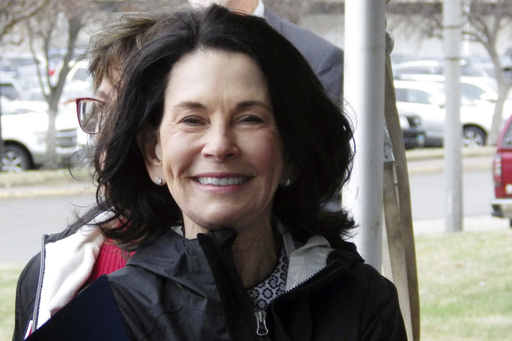BISMARCK, N.D. (AP) — U.S. Rep. Kelly Armstrong won Tuesday’s Republican primary for governor of North Dakota, while longtime public utilities regulator Julie Fedorchak finished first in a rambunctious GOP race for the House seat he will vacate. Each will be in a commanding position for the November general election in the conservative state.
Armstrong, who currently occupies North Dakota’s lone House seat, beat Lt. Gov. Tammy Miller in the race to succeed Republican Gov. Doug Burgum, who did not seek a third term and is under consideration to be former President Donald Trump’s vice presidential running mate.
“We’ve never taken anything for granted in this race. We never take our supporters for granted,” Armstrong said. “We never take North Dakota for granted, and we’re really excited, and we’re excited to move to the next step.”
Fedorchak won a five-way contest between candidates who ranged from seasoned officeholders to little-known contenders. She would be the first woman to represent North Dakota in the House.
Also Tuesday, voters approved a high-profile initiative that would bar people from running or serving in the U.S. House or Senate if they are to turn 81 years old during their term.
The GOP primaries are key to winning office in North Dakota, where Democrats have not won a statewide contest since 2012 and Republicans have held the governor’s office since 1992. Some legislative races had only GOP candidates this year, and two GOP state officeholders were running unopposed.
Armstrong, an attorney and former state senator who is serving his third term in the House, had endorsements from the state party and from Trump. Miller did not attend the GOP convention but had Burgum’s endorsement.
Armstrong said he plans to fly back to Washington on Wednesday morning but his campaign will soon reset to focus on the general election. He will face Democratic state Sen. Merrill Piepkorn, who won his party’s primary unopposed.
Independent Michael Coachman, who once tried unsuccessfully to get a Burgum recall, is also seeking the governorship. He was not on the ballot Tuesday and has not yet submitted signatures for November.
The next governor will take office in mid-December, weeks before the biennial legislative session begins. Whoever takes up the post will be tasked with balancing priorities, spending and tax cuts during a time when state finances are healthy, and also considering property tax reform, said Jim Poolman, a former Republican state insurance commissioner, lawmaker and party official.
In the House primary won by Fedorchak, a longtime public service commissioner, other Republican contenders included military veteran and former U.S. State Department employee Alex Balazs; plastic surgeon and former state Rep. Rick Becker; Williston resident Sharlet Mohr; and Cara Mund, an attorney and former Miss America who ran unsuccessfully as an independent in 2022.
Fedorchak will face military veteran Trygve Hammer, who won the Democratic primary over Roland Riemers, in the general election.
On Tuesday she condemned text messages that were sent to some phones portraying her as as dropping out, calling them “at minimum election fraud” and saying her campaign will file a complaint. It was unclear how widespread the messages were. Secretary of State Michael Howe said his office has fielded queries from a handful of county auditors and called the messages misleading and untruthful.
Balazs, Becker and Mohr said they were not behind the messages, and Mund said via Facebook that she did not authorize anyone to “spam” cellphones. A spokeswoman for the state Democratic-NPL Party also denounced the messages.
The House campaign was marked by tough, negative ads in a contest of “who can be the Trumpiest,” said Earl Pomeroy, a Democrat who held the seat from 1993 to 2011.
The ballot measure setting the congressional age cap is intended to avoid age-related and cognitive issues among officeholders, supporters say.
Some legal experts view it as a test case for revisiting a 1995 U.S. Supreme Court ruling against congressional term limits. A state legislative panel attached a $1 million cost estimate to the measure in anticipation of a lengthy legal challenge.
Republican U.S. Sen. Kevin Cramer, who had no primary challenge to his reelection bid, opposed the measure, saying voters should be able to choose whomever they want.
“To limit those decisions arbitrarily just doesn’t make sense to me,” Cramer said.
Despite the primaries’ decisive nature, they historically have seen low turnout, varying from 17% to 27% of eligible voters from 2014 to 2022.
This website uses cookies so that we can provide you with the best user experience possible. Cookie information is stored in your browser and performs functions such as recognising you when you return to our website and helping our team to understand which sections of the website you find most interesting and useful.
